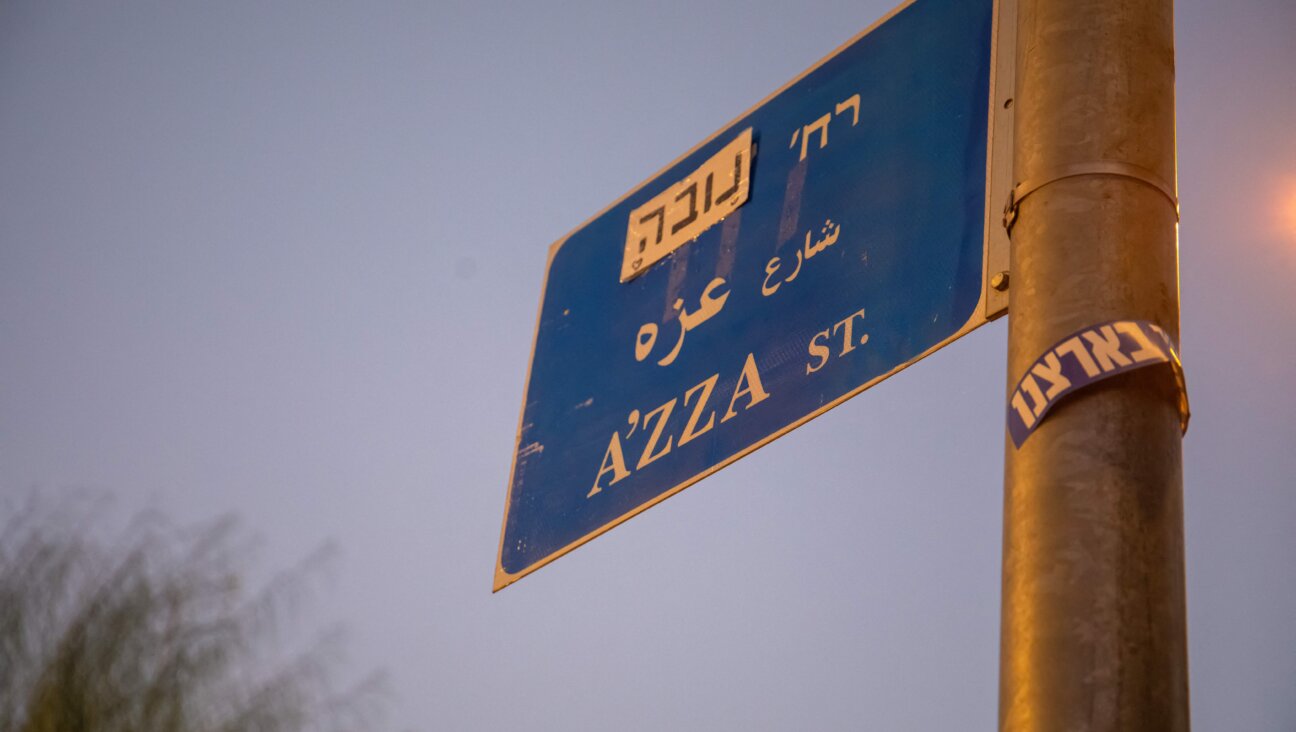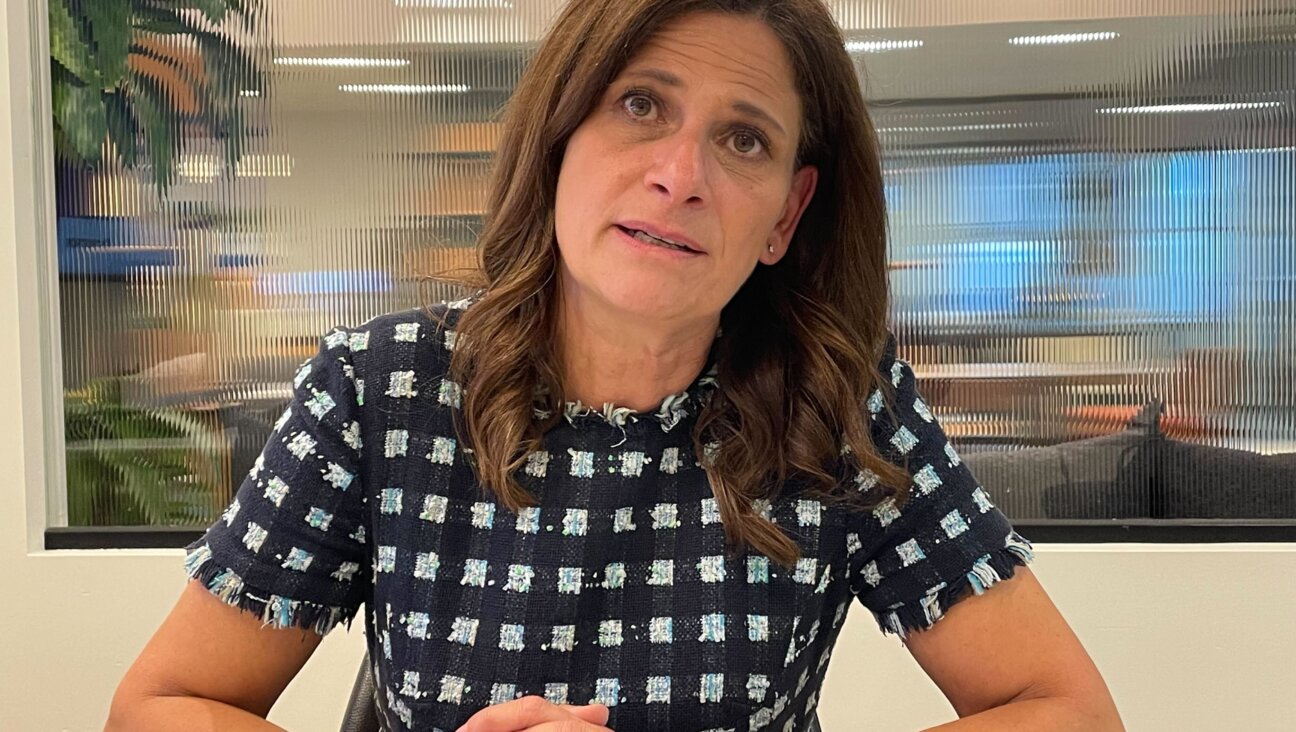For New Israelis, Hebrew Names Are About Autonomy, Not Assimilation

Image by Getty Images / Montage by Anya Ulinich
Born to a Jewish family on Long Island, Jessica Singer was given the Hebrew name Yehudit, after the ancient figure said to have saved the Israelites by beheading an Assyrian general.
For most of her life, Singer went by her Hebrew name in synagogue only. When she legally changed her name to Yehudit at age 24, she wasn’t necessarily channeling the heroine; she simply wanted to fit into her new home in Israel.
“I felt if I went by Jessica in Israel I would be sticking out like a sore thumb,” she said. “Everyone would know by looking at a piece of paper that I was an immigrant.”
By changing her name to a Hebrew one when she moved to Israel, Singer joined in a tradition that predates the State of Israel itself. For more than 100 years, Jewish immigrants to the Holy Land have been Hebraizing their names. Sometimes a first name or a surname is adjusted to a Hebrew variant. Other times, a new Hebrew name is adopted entirely.
The practice is ideological in its origins. For the earliest European Hebraizers, changing one’s name was a way of shedding a Diaspora identity and becoming part of the nascent Hebrew republic. Later, Hebraizing became a form of assimilation for Jews from Eastern countries — and not always by choice. The pressure to become Israeli by taking on a new name is still a raw memory for many Jews of Arab, Moroccan and Ethiopian descent, and their resentment at the practice even became part of the rhetoric in the recent national elections.
Today, the custom is rare. New Israelis who choose Hebrew names do it to fit in, or to avoid endlessly explaining their foreign names to native-born Israelis. In Singer’s case, that worked only to a degree.
“What I didn’t know is that the name Yehudit in contemporary Israeli culture is the equivalent of naming your child Gertrude,” she said, laughing. “They either assume I’m an old woman or Haredi. I find that to be really funny.”
The practice of taking on a new name to integrate is practically a global immigrant phenomenon. It is also deeply entwined in the Jewish story. Every American Jew is familiar with the tales of Ellis Island immigration officials Americanizing difficult-to-pronounce Eastern European names at the turn of the past century. In recent years, that narrative has been challenged. Historians say immigrant names were often misspelled in ships’ manifest documents or by immigrants themselves. But the message still holds. Whether by choice or coercion, Jews have changed their names to meld with their surroundings.
For the early Jewish immigrants to Palestine, however, Hebraizing names wasn’t about fitting into an existing culture but about building a new national Israeli one. It was about autonomy, not assimilation.
“The main motive for Hebraizing names is that people who came to the Land of Israel at the end of the 19th century wanted to sever their ties with the galut [Diaspora], with all of Eastern European culture,” said [Gabi Birnbaum, a senior researcher at The Academy of the Hebrew Language, in Jerusalem.
According to Birnbaum, there were a few Hebraizers among the tens of thousands of Jews who came to Ottoman Palestine in 1882 during what is known as the First Aliyah. The practice became widespread during the Second Aliyah between 1904 and 1914, with the revival of the Hebrew language.
The Zionist founders were avid Hebraizers: David Gruen (also spelled Green) became David Ben-Gurion decades before he announced the State of Israel; Moshe Shertok, from modern-day Ukraine, became Moshe Sharett, Israel’s second prime minister; Golda Meyerson, raised in America, became Golda Meir, Israel’s fourth prime minister; Aubrey Solomon, from South Africa, became Abba Eban, a diplomat and scholar.
Ben-Gurion in particular was a zealous evangelizer for the practice. He famously demanded that diplomats and military personnel take on Hebrew names. Though Hebraizing is no longer mandated in the diplomatic corps, it is not unheard of. Michael Oren, a former ambassador to the United States, for instance, was born Michael Bornstein in New York.
“Ben-Gurion was very, very fervent about these things,” Birnbaum said. “Whenever he met anybody who did not have a Hebrew name, he immediately remarked, ‘You have to Hebraize your name.’”
Hebraization also had its detractors. Some warned that it amounted to an erasure of Jewish history. The legendary Hebrew linguist Yitzhak Avineri was cautious about Hebraization, Birnbaum said, even though he himself had changed his last name from the Slavic Rebeleski. He advised immigrants with classically European Jewish names not to rush to revision. He also said that Holocaust survivors should not Hebraize their names if they were the only one remaining in their family, Birnbaum said.
It didn’t take long for Hebraization in Israel to become a part of the assimilation process for new immigrants. When Middle Eastern and North African Jews came to Israel in the 1950s and ‘60s, the Ashkenazi establishment took “the whole concept of getting out of the ghetto and getting out of the shtetl and they applied it to us,” said Sami Shalom Chetrit, a Queens College professor who is of Moroccan-Israeli origin.
For the children of these new immigrants, Hebraizing often occurred in school, and typically without permission of the family.
“In some cases children actively opposed the imposition of new names, and stated their wish to continue to use their original names,” the folklorist Abraham Stahl wrote in his 1994 study of the topic in the journal Names. “More often, however, the children submitted to the pressure exerted by their new environment and learned to live with their new names.”
Chetrit, who grew up in Ashdod in the late 1960s, was one of the resisters to this phenomenon. He recalled his teacher reading a list of new names for the classroom, made up mostly of French-speaking North African Jews: “Alif, your name from now on will be Aliza; Jackie, your name is Jacob, and Michele, your name is Michal. She kept going alphabetically. Then she said, ‘Sami, your name will be Shmuel Shalom.’
“I went to my father, crying… I really felt like something was stolen from me, something precious. I said: ‘They changed my name! They changed it!’”
The next day, Chetrit’s father gave the teacher a lecture about the origin of his son’s name. In Arabic, “Sami” comes from the root “samar,” meaning “heavenly superior,” he told her, adding that the name was “international.”
“He told her, ‘I forbid you or any teacher to change the names of my kids,’” Chetrit said.
While many Mizrahim were given Hebrew first names, a smaller number voluntarily altered their surnames in hopes that it would help them climb the Israeli social ladder. Some also did so out of a desire to distance themselves from their Arab origins. In one story that made the Israeli papers, Chetrit said, a young Moroccan Israeli named Yiram Attiya changed his last name to Netanyahu after a chance encounter with an Arab woman named Attiya left him horrified at their shared identity. Chetrit wrote about the incident in his poem “A Man Seeks Roots.”
Today, Hebraization remains a delicate topic for many Mizrahim. Aryeh Deri, leader of the Mizrahi Orthodox Shas party, railed against the pressure to Hebraize in the recent Israeli election. He added his Moroccan middle name, Makhlouf, to his campaign material.
“The invisible ones are those Mizrahim whom society has embarrassed into changing their family names, changing Shukrun to Sharon, Dahan to Dan, Sabag to Segev, Abutbul to Avital, Siboni to Regev!” he said in one campaign video.
But Deri isn’t the only one reclaiming his original name, Chetrit said.
“Artists and writers are coming back to their names because it is part of declaring some independence in their cultural identity,” he said. “It is to make peace with themselves, with their fathers and their mothers. For so many years it was like hiding something. It turned out there was no reason for that, really.”
This trend is happening in the Ethiopian community, too. When Ethiopian aliyah intensified in the 1990s, new immigrants were given Hebrew names in addition to their Amharic ones. This disrupted an intricate Ethiopian tradition in which an individual takes on the first name of his parent as a last name when he gets married, said Fentahun Assefa-Dawit, an Ethiopian-Israeli activist. In Assefa-Dawit’s case, Assefa is his father’s first name, Dawit his grandfather’s first name and Fentahun his own name. Fentahun means, “May you be the one who remains with us” in Amharic, a reference to the fact that his mother miscarried twice before she gave birth to him. Like some Ethiopian Jews, Assefa-Dawit came to Israel with a Hebrew name: Natan. It was given to him at his synagogue in Gondar, Ethiopia.
He said that Israeli immigration officials asked if he would like “Natan” on his identification forms.
“I said, ‘My name is very long and there is no need to put ‘Natan’ in there,’” he said.
Assefa-Dawit, who runs the human rights organization Tebeka, said that Ethiopian immigrants have both their Hebrew names and their Amharic names on their identity cards. For years, however, the Hebrew names were privileged by teachers and officials. Now, Ethiopians are insisting on going by their Amharic names. One example is Tel Aviv’s deputy mayor, Mehereta Baruch-Ron, who went by the Hebrew name Ruchama until she graduated from university and switched back to her Ethiopian moniker.
“It sends a message to the veteran Israelis, saying, what I came with from Ethiopia is more important than what I acquired here,” Assefa-Dawit said. “This gives me the possibility of passing across the generations this thousands-years-long tradition into Israeli society.”
By the time 165,000 Russians poured into Israel in the 1990s, Hebraization was already waning as a national trend. It did not hold the same sway for those Russian olim, whose mass immigration was prompted not by Zionist fervor, but by their desire to leave the Soviet Union.
At the same time, Israeli society was more forgiving of foreign names. Of course, some Russians did change their names. Natan Sharansky, chairman of the Jewish Agency for Israel and a Soviet human rights activist, was born Anatoly Borisovich Shcharansky. But the social pressure on immigrants had lightened up considerably.
“You could be Arkadi and Yevgeny and not provoke resentment or a sense of estrangement,” said Hillel Halkin, an Israeli writer and translator. “It is in a sense a loss of nationalistic fervor.”
And yet, a small portion of new Israelis Hebraize their names even today. About 15% percent of British and American immigrants who come to Israel on flights facilitated by the Nefesh B’ Nefesh aliyah group change their names as soon as they arrive. The legal switch is done at Israel’s main airport, named for the most famous Hebraizer of all, David Ben-Gurion.
Sometimes, Israeli law comes into play with Hebraization. An immigrant who wants to Hebraize his name to Cohen must provide a written letter from a rabbi stating that he or she is indeed a descendant of the priestly kohanim tribe. The same goes for several other Jewish names with biblical origins. Israelis are allowed to change their names once every seven years.
But not every new immigrant comes with a Hebrew name in mind. That’s where The Academy of the Hebrew Language comes in. The state-run organization provides a free but barely utilized service to help people Hebraize their names.
Keren Dubnov, a researcher there, said there are two main ways to Hebraize a name, by keeping the meaning or the sound intact. Very rarely, it is possible to do both, a kind of Holy Grail of Hebraization. She gave the example of the typical American name Stephanie. Stephanie means “crown” in Greek, so a Hebrew substitute with the same meaning might be Atara or Ateret, Dubnov said. But if Stephanie wants a name closer in sound to her original one, she might go with Stav, Sivan or Osnat.
“You give several ideas,” Dubnov said. “This gives the people freedom because it is such a private kind of question. It is not about grammar or some special term in chemistry. It is a very intimate part of life.”
For Singer, going from Jessica to Yehudit wasn’t simple. At the beginning, she used Yehudit with Israelis, reverting to Jessica with other Americans in Israel. Later, when she went by Yehudit full time, she found herself confessing to close friends that it wasn’t her birth name.
Now, 11 years after she moved to Jerusalem, she finally feels like Yehudit. “I guess it just took me a while to feel that it is my natural self,” she said.
Contact Naomi Zeveloff at [email protected] or on Twitter, @NaomiZeveloff
A message from our Publisher & CEO Rachel Fishman Feddersen

I hope you appreciated this article. Before you go, I’d like to ask you to please support the Forward’s award-winning, nonprofit journalism during this critical time.
We’ve set a goal to raise $325,000 by December 31. That’s an ambitious goal, but one that will give us the resources we need to invest in the high quality news, opinion, analysis and cultural coverage that isn’t available anywhere else.
If you feel inspired to make an impact, now is the time to give something back. Join us as a member at your most generous level.
— Rachel Fishman Feddersen, Publisher and CEO
























